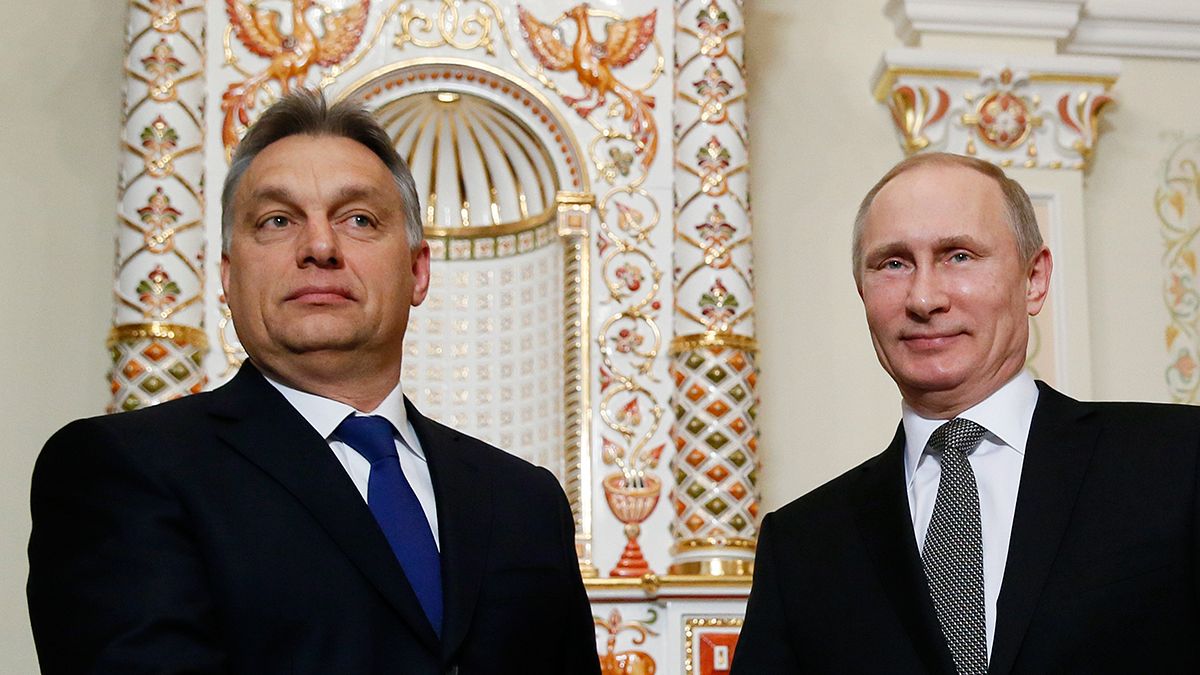This Sunday, Hungarians are heading for the polls to elect a new parliament. Up until voting day, euronews looks at the main aspects of campaigning and at measures the current government introduced in the last four years. Here, we focus on a foreign policy which was hardly characterised by caution.
The governing Fidesz party battled EU institutions almost constantly, and so Hungarian foreign policy shifted eastwards. The government made no secret of it. It even courted authoritarian regimes. These awkward manoeuverings created some difficult positions. We’ll hear from a foreign policy analyst, after this report from our correspondent about the winding road of diplomacy.
For the past four years, the ruling politicians in Hungary (‘Republic of Hungary’ before an official name change in 2012) have been condemned by civil rights and opposition groups at home and have also raised serious objections outside the borders.
Prime Minister Viktor Orban launched his government in 2010 by offering nationality to ethnic Hungarians living in other countries. Half a million of them have taken him up on the offer. Neighbouring Slovakia was furious. It said this threatened Slovakian national security. It feared that with this could come concentrated demands by these citizens for territorial annexation. Relations went sour.
Next, there were convulsions when the governing Fidesz party introduced a law giving it control over the news media. Regulators were picked by Fidesz. Content made journalists liable for heavy fines, inviting self-censorship. The European Union told Hungary this flew in the face of democratic standards. Budapest’s fast changes of the constitution were “incompatible” with the EU, the Tavares Report concluded.
Our correspondent in Budapest, Andrea Hajagos, said: “The previous prime ministers of Hungary, who took the rules of the EU much more seriously, had a Hungarian flag and an EU flag outside the window of their office in parliament. When Viktor Orban became prime minister, the EU flag was changed for another Hungarian one.”
Peter Balazs, a former foreign minister, said: “It seems the government doesn’t feel good inside the EU. It manoeuvred itself to the periphery, criticised the EU and tried to shrug off the EU’s discipline. Of course it did accept the EU’s money.”
The United States could afford to distance itself more. Washington showed its displeasure. For the first time since the end of Communism in Iron Curtain Europe, a Hungarian prime minister was not invited to the White House during his four years in office — that was Orban.
He did it his way with the International Monetary Fund, as well. He told it Hungary’s economic policies were those of a sovereign nation, and IMF lending conditions were not all right.
Budapest preferred to finance its future from China, Saudi Arabia and Azerbaijan. Fidesz reached out to these countries to buy Hungary’s bonds, but only managed to convince the Azeris to invest much.
That bond-buying followed Hungary’s extradition of a convicted axe murderer. Budapest said it was told the Azeri would serve his life imprisonment sentence back in Azerbaijan, where he was promptly set free. The soldier, in a NATO peace programme in Hungary, had all but severed the head from the body of a participant from Armenia — as he lay sleeping.
The Fidesz government pursued an export strategy it dubbed ‘Eastern Opening’.
The minister in charge, State Secretary for Foreign Affairs and External Economic Relations Peter Szijjarto, said: “We see that the EU is facing economic challenges but that the Middle East and Asia have very serious growth potential, so this is a strategy we would like to keep.”
Hungary has also been committed for future decades to former Soviet master Russia, which will lend it ten billion euros to expand its nuclear power plant. MPs from Fidesz and the far-right Jobbik party approved the deal.
The EU questions the lack of formal bidding for the contract and the conditions not being made public.
Our Hungarian election coverage anchor Gabor Kovacs spoke with analyst András Deák by satellite link with Budapest.
Gabor Kovacs, euronews: “András, how do you describe this government’s foreign policy?”
András Deák, analyst: “I think it just drifted: there was no strategic thinking; it just happened. This government’s foreign policy was subordinate to domestic politics and economics.”
euronews: “You think domestic politics forced the government to more or less improvise?”
Deák: “Yes, it had to run to keep up, because it had a two-thirds majority and totally transformed the constitution. It chased after things because its crisis management was unorthodox. And it had to run after far right voters.
The far right programme of the Jobbik party infiltrated foreign policy. The foreign ministry had no say. Foreign policy was not important.”
euronews: “And yet, the so-called Eastern Opening was important — the government placed great emphasis on it.”
Deák: “Yes, but in the beginning that was linked together with anti-EU sentiment. We are turning eastward because we criticise the EU and the West. This policy shows an active desire to do that; the government has ignored the long-term risks in return for only short-term benefits. This crisis management was an option which made it possible for the government to gain economically, to earn money by selling state bonds.”
euronews: “Has the new nuclear contract and Russia’s role become emblematic of the government’s foreign policy?”
Deák: “The cost to Hungary’s foreign policy is obviously high, and it has become an emblem, because it shows the country has really turned east: it means Hungary is trying to set a course to sail eastward.”
